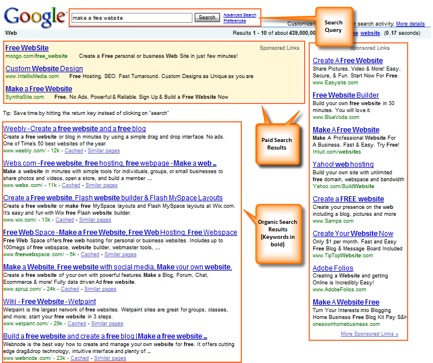Oh Say Can You Be Seen: Get your site noticed (Part 2 of 3)
In the first part, we introduced search engine optimization, and how it’s vital for getting your website noticed by people who are searching for sites like yours.
In this part, we’ll show you how search engines work and how they rank their results.
Take a spin with a search engine
You may wonder how search engines know what to display when you search for a given keyword or phrase, and how they know what order to present the results to the user. It all starts with a query, or keyword or phrase that users enter in search engine, like these:
Search Engine Queries


![]()
When you enter the keyword or phrase and start your search, the engine displays the results on a Search Engine Results Page (SERP).

A SERP presents two kinds of search results: paid search results, and organic search results. SEO focuses on the organic search results.
The inner workings of a search engine
All of the major search engines have their own homegrown technology, or algorithm, for finding and ranking information, but they follow the same basic process:
How Search Engines Work

- Search engines’ servers have programs on their Web servers called “spiders.”
- These spiders crawl the Web to gather page content.
- The spiders find pages on your website and collect information from the content and meta tags.
- The search engines’ spiders follow the internal links on your site and index its content.
- When searchers search on a given keyword or phrase, results from the index are displayed in order of rank on the SERP.
Tune up your site to increase your ranking
SEO means designing a new site or improving your existing site to improve your ranking, or position, in the organic search results. Making an SEO-friendly website involves these four parts:
- Site Architecture and Design: Your website as a whole and its individual web pages should be laid out to make it easy for spiders to read.
- Keyword Research: Your website should use keywords that are not only popular, but also relevant.
- Content & Meta Development: Your website’s content should not only be keyword-rich, but also informative and easy to read. Also, your site’s title and meta tags should be relevant and keyword-rich.
- Linking: Your website gains credibility in the eyes of the search engines when other relevant sites link to yours.
More of the Hottest Online SEO Resources On the Web
Here are some more of the hottest online SEO resources out there:
- http://searchenginewatch.com/2168031
- http://2earn-online.com/How_to_bring_more_people_to_your_website
- http://2earn- online.com/How_to_make_my_website_come_up_first_in_Google
- http://2earn-online.com/How_important_is_Google_page_rank
- http://www.searchengineguide.com/mike-moran/how-do-you-get-a-specific-web-page-index.php
- http://www.searchengineguide.com/stoney-degeyter/your-site-is-keyword-optimized-but-is-it.php
- http://training.seobook.com/search-engines
- http://www.seobook.com/relevancy/
In Part 3 of our series, we’ll talk more about some considerations before you begin the SEO process. Also, stay tuned for more details about things you can do to make your site SEO friendly.
..and don’t forget – if Your domain name consist of words from search query – it will be more relevating..
(i’m the WebClippee – your tip(or tricks) of a day
Good Article,
One key point about search engines is that the more pages you have indexed the more search engine hits you receive. So adding lots of useful relevant content helps bring traffic.
Nice article, good work on a complicated topic.
Randy
Thanks for more information about SEO tools.The process of getting your website to the top of the search engines. Its also good to know about this SEO tool.Thank you.
Outstanding points Thank you Will come back for more.
Will come back for more.
Really appreciable.The process of getting your website to the top of search engines. It is also good to know about this SEO tool.All the best.
Pingback: Shared Hosting
Pingback: SEO, SEM and PPC: An Easy Intro for Small Business Part 1 | Yola